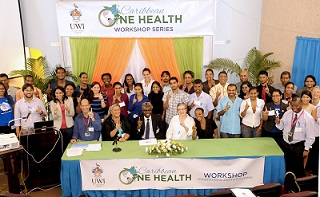As a medical professional, I always cringe when I hear about a creepy new disease emerging in some far off land. Gone are the days when we could say: “Nah, that is only in Asia or Africa, Trini people safe!”
In our increasingly connected world we get both the good and the bad. The good includes exotic fruit from Latin America, beef from Canada, milk from Germany, clothing from China, shoes from Italy and so on. Along for the ride are ‘the bad’; the world’s best travelers; the microbes and other organisms hitching rides through our global trade. They travel on our food, through our bodies and via our animals.
Global to local
In sweet T&T we are now faced with problems that we thought would never show up in our back yard. Lionfish, an invasive species found literally on the other side of the world, is now at home in our waters, putting pressure on our already declining fisheries. We panicked when we suspected bird-flu was here; a virus first seen in China. More recently, the Chikungunya virus, first described in Tanzania, has crossed many borders and has made its home throughout the Caribbean. It is now here.
These problems are complex. They can’t be solved with a cool new app. What can we do?
One Health
One Health is an approach that offers hope for dealing with global issues that affect us locally. According to Dr Carla Phillips, a lecturer at the University of the West Indies School of Veterinary Medicine (SVM), “One Health is about recognising that human, animal and environmental health are all intricately connected and that no one professional group possesses all the skills needed to effectively address the threats that face humans, animals and the environment. However, together we can make the difference.”
One Health emphasises a holistic approach that is collaborative and integrative. It provides a way to make sense of the many sides of health for humans, animals and the environment.
In T&T, One Health is being pioneered through the SVM. Dr Phillips along with USA-based Drs Cindy Driscoll and IIze Berzins facilitated the first One Health Caribbean workshop at the SVM on June 24 and 25. The workshop focused on the conservation of aquatic ecosystems from a One Health perspective. It attracted participants from across the Caribbean and from various sectors locally, including energy, education, food and agriculture and the environment.
Why focus on aquatic ecosystems?
In a way, each of us is an aquatic ecosystem. We are made up mostly of water. Water flows in and out of us all the time. It flows in when we drink. It flows out through sweat, urine and tears. Water is essential to life. We can survive without food a lot longer than without water.
If we’re interested in being healthy, we need to look at the bigger picture; at what connects us. Water connects us to each other and to our environment in a very intimate and personal way. It’s a good place to start.
A One Health Workshop
Dr Phillips was inspired to organise the workshop following her experience with the Petrotrin oil spill in December 2013. The oil spill made people sick. It killed wildlife, and it prevented many people from earning a living. Its effects are still being felt; economically, socially and environmentally.
In Dr Phillips’ opinion, the oil spill highlighted the interconnections between marine and coastal environments and animal and human health. Dr Phillips and her colleagues recognised an opportunity to use this environmental disaster to highlight how a One Health approach could be helpful in addressing this and other problems. She explains that if a One Health approach had been used for the oil spill, some of the gaps that were evident during the disaster response could have been avoided.
Throughout the workshop, the facilitators demonstrated the potential uses of a One Health approach in the Caribbean.
Drs Driscoll and Berzins emphasised that the Caribbean basin is an aquatic-based system. Many Caribbean economies are dependent on healthy aquatic ecosystems particularly for public health, tourism and fisheries.
Dr Phillips gives vivid examples that demonstrate our connections to our Caribbean neighbours. “Fish and other seafood originating in the waters of Trinidad and Tobago end up on the plates of our friends in Jamaica. Industrial and other pollutants that enter our oceans and waterways bioaccumulate in the aquatic organisms that we humans ultimately consume. Human activities that result in environmental degradation negatively impact aquatic habitats and the organisms that live therein and ultimately impact human health and well-being.”
The One Health workshop was a first; bringing professionals together to work for a healthy, watery Caribbean. It is hoped this is the first of many more. With new challenges and diseases regularly emerging, the work of Dr Phillips and her colleagues is becoming increasingly important.
About Dr. Gibson
Dr Adana Mahase-Gibson is a project management professional and Doctor of Veterinary Medicine. She works in the field of sustainable development with communities, government, businesses and NGOs in Trinidad and Tobago under the banner of Ecohealth. The column looks into the intricate connections of human, animal and environmental health through a sustainability lens. (Pic – Trinidad Express)














